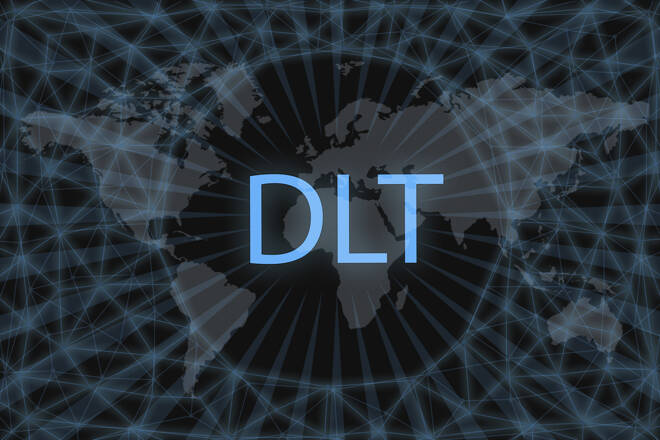Advertisement
Advertisement
The Role of Blockchain in Finance
By:
Intro
Are We Close to Mainstream DLT Adoption in the Financial Space?
Blockchain offers tremendous benefits for businesses. The question is whether they will use them to their advantage.
The rapidly progressing adoption of blockchain technology and cryptocurrencies are disrupting the financial industry.
According to CoinMarketCap, the crypto market – which now includes over 9,800 digital assets – has a combined capitalization of $1.25 trillion, outpacing Apple on the road to challenge gold’s leading position ($11.65 trillion).
At the same time, a recent report estimates the blockchain market to expand from 2019’s $2.01 billion to $69.04 billion by 2027 at a compound average growth rate (CAGR) of 56.1%.
By now, it has become clear that distributed ledger technology (DLT) is in high demand.
But how can blockchain and crypto help financial organizations in improving business efficiency?
Blockchain Is More Than Crypto
When most people hear the phrase “blockchain”, the first thing that comes to their minds is cryptocurrency.
Indeed so, blockchain is the underlying technology of crypto, which powers nearly all digital assets on the market while promoting transparency, high security, peer-to-peer (P2P) transactions, and decentralization.
That said, blockchain is not solely about cryptocurrency transactions. Instead, DLT can be used in almost any field related to data delivery and information processing.
For that reason, many companies are either considering or already adopted blockchain technology to enhance their business processes.
Despite that DLT is still in its very early form, there are many examples of large corporations utilizing the blockchain for real-world use-cases.
One is Walmart that has partnered with IBM and Unilever to leverage the Hyperledger Fabric blockchain for tracking product supply chains.
IBM also has its own blockchain, with the multinational tech firm becoming a leading B2B distributed ledger technology provider in recent years.
Real-world blockchain applications continue to proliferate, with an increasing number of companies integrating DLT-based solutions into their business processes to achieve higher efficiency.
Through transparency in a decentralized environment, businesses can promote trust as well as attract new customers and increase their existing clients’ loyalty, who can now track their products to assess their quality via the blockchain.
In China, the clothing-retail giant H&M partnered with the VeChain blockchain platform to implement a similar solution.
By leveraging DLT, the company’s customers can access detailed information about the production of branded clothing by simply scanning a QR code via their smartphones. Furthermore, shoppers can even watch videos of how the products in the stores were made in the factories.
The Power of Blockchain
As you can see, blockchain is a powerful tool for businesses.
And for an excellent reason, DLT offers both service providers and end-users tremendous benefits compared to traditional systems.
Due to its transparent nature, blockchain technology allows data to be tracked from start to finish, eliminating the need for blind trust from customers. At the same time, it offers an opportunity for businesses to attract more users.
Furthermore, blockchain transactions are peer-to-peer, which means there’s no need for intermediaries or other third parties. As a result, companies can significantly reduce their operational costs while improving business efficiency by accelerating and automatizing processes via smart contracts.
Despite the traceability and visibility of blockchain transactions, users do not know the real persons behind the transfers, which makes them more private than traditional solutions.
How Businesses Adopt Crypto
Blockchain and cryptocurrency often walk hand in hand.
For that reason, many businesses are increasingly exploring crypto as an asset class for investments.
Since 2020, we have seen that this has become a growing trend among not just private and digital asset businesses but also publicly traded companies.
For example, MicroStrategy, Tesla, and Square have invested $2.24 billion, $1.5 billion, and $220 million in BTC to date, respectively.
But what would happen if businesses decided to adopt cryptocurrencies for payments as well?
The thing is, many of them already did.
In addition to the travel industry where digital assets have demonstrated increased adoption for payments (e.g., Expedia, airBaltic, LOT Polish Airlines), large enterprises like Microsoft, Starbucks, AXA Insurance, etc. have integrated crypto as a payment method for their solutions.
Furthermore, while PayPal has already added support for crypto transactions, Visa and MasterCard are racing against each other to integrate digital asset settlement into their massive payment networks.
Cryptocurrency Promotes Financial Sovereignty
Compared to fiat currency, crypto has three major advantages: autonomy, convertibility, and decentralization.
Blockchain networks are highly resilient against network issues and do not require third-party intervention to operate.
For that reason, cryptocurrencies are virtually independent of government action, with the latter potentially causing severe failures in the monetary system that can often lead to economic collapses.
Furthermore, with the industry maturing, it has become much easier to exchange fiat currency to crypto with only a small commission.
Thereby, crypto can be effectively used for cross-border transactions, which usually feature much faster settlements and cost-efficient fees compared to traditional international transfer (especially for payment-optimized assets like XRP or XLM).
Businesses Must Adopt Blockchain to Become More Efficient
Blockchain is a technology that is still being studied.
Yet, despite its early development stage, DLT already has a lot to offer for the companies willing to adopt it.
Besides, as more of blockchain’s potential gets harnessed, we will undoubtedly see drastic changes in the financial industry and many other sectors as key players seek to achieve greater operational efficiency.
Petr Kozyakov, co-founder and CEO at the global payment network Mercuryo
About the Author
Petr Kozyakovcontributor
Petr Kozyakov is Mercuryo’s co-founder and CBDO. Has strong background in the payments industry and extensive experience working with European markets.
Advertisement
Advertisement
Advertisement
Advertisement
Advertisement
